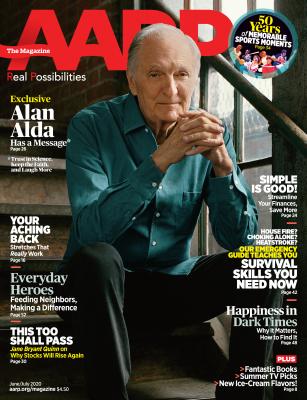Six-Time Emmy® and Golden Globe® Award-Winner Alan Alda on the Power of Communication and Science in AARP The Magazine
The Iconic Actor and Advocate Stresses the Importance of Laughter, Positivity and Science During These Uncertain Times
LOS ANGELES—Beloved actor, director and comedian Alan Alda, who stole America’s heart as army doctor Hawkeye Pierce on the hit TV sitcom M*A*S*H, gives an inside look into the lessons he’s learned during the current crisis, plus describes his heartfelt mission to help scientists communicate their knowledge more effectively in the June/July issue of AARP The Magazine (ATM).
The 84-year-old actor is working harder now than ever before. When he’s not gracing the stage or screen, he’s focusing his energy on teaching people how to communicate better with one another, relying heavily on science – the importance of evidence and rigorous studies, and the idea that scientific research only advances knowledge a little bit at a time. He states, “Making people aware of the process helps increase appreciation and respect for science, and that helps us make informed decisions for our families and ourselves.” Alda’s podcast, Clear + Vivid With Alan Alda, which features all-star guests like Tom Hanks and Sir Paul McCartney, serves as a platform to talk about the importance of and connection between communication and science.
During the current crisis, communicating science matters more than ever to Alda. Not only is he in the age group most at risk for COVID-19, but he’s also battling Parkinson’s disease. Alda, however, does not let that get him down. Instead, he focuses his energy on the many positives in his life, and also having lots of laughter with his wife of 64 years, Arlene. He considers laughter one of the greatest benefits during this time; as he notes, when you laugh, you’re vulnerable, and when you’re vulnerable, you’re opening yourself up. “You gain so much through vulnerability,” Alda says. “You let the other person in, and that brings us all closer. We can’t take ourselves too seriously, even now.”
The following are excerpts from ATM’s June/July 2020 cover story featuring Alan Alda available in homes starting in June and available online now at aarp.org/magazine.
On ignorance:
“We don’t value our ignorance enough. Ignorance is really good to have if it’s combined with curiosity, and scientists are professional curiosity machines. We should all imitate that as much as possible. Now it’s clear that our lives depend on it.”
On people’s attitude toward communication and science:
“There are pockets of people who still think science is just another opinion. That mindset puts us all in danger, because it can infect people across the country. So, I’m very concerned about the casual attitude many people have toward science.”
On surviving Polio as a child:
“It was hard on me. It was harder, I think, on my parents, who couldn’t afford a nurse and had to torture me themselves. It’s always better to pay somebody to torture your kid.”
On coping with Parkinson’s disease and its symptoms:
“I move to music a lot. I take boxing lessons from a guy trained in Parkinson’s therapy. I do a full workout specifically designed for this disease. It’s not the end of the world when you get this diagnosis.”
On his secret to marriage:
“Arlene’s answer is that the secret to a long marriage is a short memory. My answer? Love.”
On his view of the world:
You know, with the world changing so rapidly, there’s no point in being optimistic or pessimistic about anything. You’ve just got to surf uncertainty, because it’s all we get.”
# # #
About AARP
AARP is the nation’s largest nonprofit, nonpartisan organization dedicated to empowering people 50 and older to choose how they live as they age. With a nationwide presence and nearly 38 million members, AARP strengthens communities and advocates for what matters most to families: health security, financial stability and personal fulfillment. AARP also produces the nation's largest circulation publications: AARP The Magazine and AARP Bulletin. To learn more, visit www.aarp.org or follow @AARP and @AARPadvocates on social media.
































































